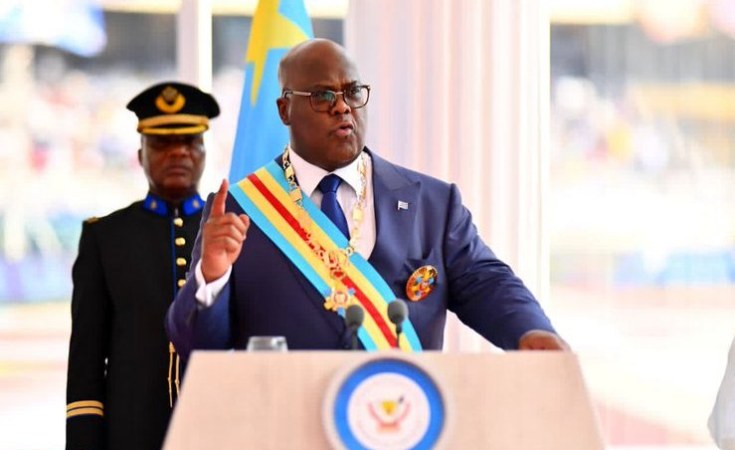The Democratic Republic of Congo (DRC)'s President Felix Tshisekedi must use his second and final term in office to address the human rights crisis engulfing the country, Amnesty International said following the inauguration of the country's new government on 11 June. The new government is led by Prime Minister Judith Suminwa Tuluka.
During his previous term, President Tshisekedi made numerous human rights pledges, but five years down the line, little to no progress has been made.Tigere Chagutah, Regional Director, Amnesty International, East and Southern Africa
Amnesty International has presented the incoming government with a five-point agenda, which outlines the key steps the new administration must take to improve the human rights situation in the country.
"During his previous term, President Tshisekedi made numerous human rights pledges, but five years down the line, little to no progress has been made. Most of the measures taken to protect human rights have been superficial, ineffective or incomplete," said Tigere Chagutah, Amnesty International's Regional Director for East and Southern Africa.
"The next five years represent President Tshisekedi's last chance to build a lasting legacy grounded in human rights. He -- and the incoming new government -- must urgently take steps to end restrictions on civic space, protect civilians in conflict zones, break the cycle of impunity for crimes under international law, fix the criminal justice system, and effectively manage resources to advance socioeconomic rights."
A five-point agenda to respect human rights
With a deepening armed conflict and deteriorating humanitarian crisis sweeping the DRC in recent years, and against the backdrop of the ongoing withdrawal of the UN Peacekeeping Mission, MONUSCO, Amnesty International calls on President Tshisekedi to fully respect international humanitarian law -- especially in the design, implementation and assessment of all military operations. President Tshisekedi must take concrete steps to protect civilians in conflict zones, investigate the underlying causes and drivers of armed conflicts and intercommunal violence, and address pervasive impunity for war crimes.
Amnesty International recommends that President Tshisekedi reforms the criminal justice system, which he has described as being "sick". The country's prisons must become more humane, systematic use of pre-trial detention and arbitrary detention must end, and the death penalty must be abolished.
In March 2024, after a hiatus of two decades, the government reinstated executions for people sentenced to death, claiming that punishment would deter "infiltration" and "treason" within the army. The government also said the measure would help quell gang violence, a move strongly denounced by human rights organizations, including Amnesty International.
"President Tshisekedi must reverse the government's decision and enforce a new moratorium on executions, while the authorities consider abolishing the death penalty in its entirety during this legislature. It is also essential that the criminal justice system is independent and fair," said Tigere Chagutah.
President Tshisekedi and the new government must also urgently lift the unlawful and prolonged "state of siege" in the North Kivu and Ituri provinces and ensure accountability and justice for human rights violations committed in the name of this measure. The authorities must also adopt human rights-friendly legislation that protects and promotes the rights to freedom of expression, peaceful assembly and association.
Despite President Tshisekedi's pledge to eradicate corruption, alleged squandering of public resources has resulted in the state failing to adequately resource essential socio-economic services, and thereby realize fundamental rights, including the rights to adequate food, healthcare, water, sanitation, education, and housing.
The expansion of industrial copper and cobalt mining in response to growing global demand has also fuelled housing and health rights violations on a huge scale, including mass forced evictions and pollution. The government must therefore declare a moratorium on mass evictions in the mining sector until a commission of inquiry is established and completes a comprehensive review of existing legal protections against forced evictions, and relevant policy reforms are enacted.
The human rights crisis engulfing the DRC has already gone on for far too long. The international community must put pressure on the DRC authorities to fully and effectively implement the proposed recommendationsTigere Chagutah
The DRC government must also take steps to safeguard press and internet freedoms, including by revising the 2023 Press Bill and Digital Code, and bring them in line with international human rights standards.
"The human rights crisis engulfing the DRC has already gone on for far too long. The international community must put pressure on the DRC authorities to fully and effectively implement the proposed recommendations," said Tigere Chagutah.
Background
President Felix Tshisekedi was sworn in for a second five-year term in January 2024. On 1 April, he appointed the country's first-ever female prime minister, Judith Suminwa Tuluka. On 29 May, prime minister Suminwa appointed her government, comprising 54 ministers. The new government is scheduled to be sworn-in by parliament on 11 June.
In 2019, Amnesty International outlined ten human rights priorities for the Tshisekedi administration, as he took office for his first term.


